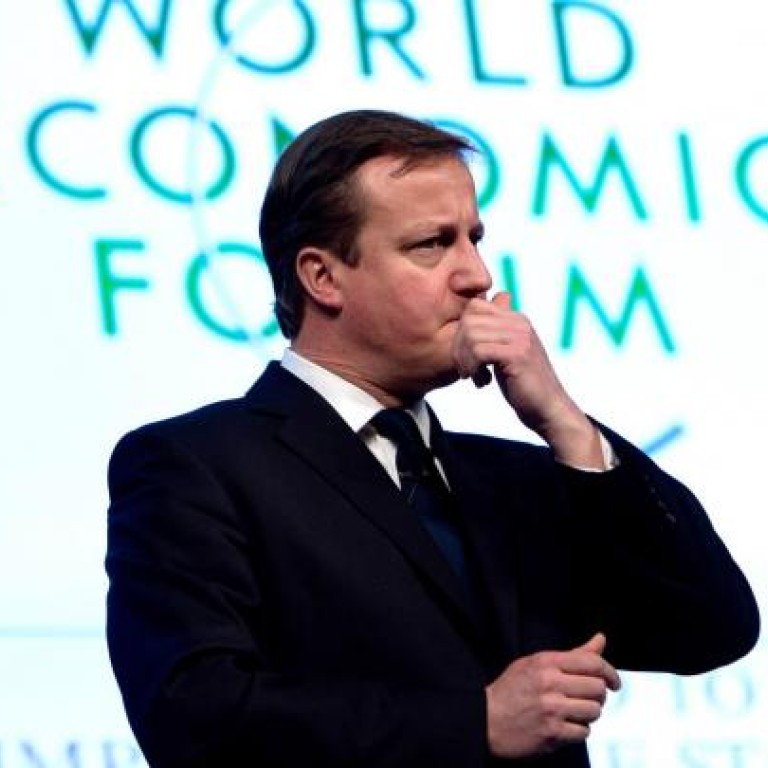
Brussels in a fog
British Prime Minister David Cameron's pledge to review country's EU membership if he wins the next election has raised uncertainty
In the 1930s, the published a headline, "Fog in (English) Channel: Continent cut off". Ironically, when British Prime Minister David Cameron finally began his long-awaited speech about his country's relationship with the European Union last week, Brussels was shrouded in fog.

He promised that if he were re-elected at the next elections due by 2015, he would renegotiate the country's membership of the European Union, and put the resulting deal to a straight "in or out" referendum allowing the British people to choose. Any decision, therefore, is five or more years away.
By fixing his promise to an election which he may or may not win, Cameron gained time, but at the expense of uncertainty for everyone.
An inevitable ugly new word has been coined, "Brixit", meaning British exit, to refer to whether or when and under what circumstances Britain will leave the EU. Fresh uncertainty will be piled on an already fragile EU.
If the EU were an aircraft, it would be taken out of service for urgent overhaul. Some of Cameron's complaints made sense, and his general tone was more reasonable and positive than the soundbites suggested. As he said, "the gap between the EU and its citizens has grown dramatically". Many opinion polls across Europe make his point.
"People are increasingly frustrated that decisions taken further and further away from them mean their living standards are slashed through enforced austerity or their taxes are used to bail out governments on the other side of the continent," Cameron said.
The sprawling EU bureaucracy spends far too much money devising and enforcing, in 23 official working languages, directives that are sometimes sensible but too frequently border on idiocy. Rules on the shape, size and diameter of fruit and vegetables are among the euromyths.
In November 2011, after spending three years investigating the issue, Eurocrats declared that drink manufacturers could not claim that water could prevent dehydration; anyone making the claim could face two years in jail. But, as if to underline its own idiocy, a week later, EU scientists decided that there is sufficient evidence to prove that water can regulate the body's temperature and help it carry out normal physical and cognitive functions.
Simon Jenkins, writing in the about Cameron's speech, said: "The EU's elder statesmen tried to run politically before they could walk economically." The subeditor who put the headline on Jenkins' column was snappier: "Cameron's speech told Europe's emperors to get dressed."
Unfortunately, Cameron addressed the need for negotiations and wholesale revisions of the EU treaty purely in terms of British demands. If the way that Europe operates has major flaws - and the euro crisis and prolonged slow growth suggest reasons for changes - then it is a matter for all the European countries.
Instead, Cameron tried to present himself as a true European being pushed reluctantly towards the exit, which could become a self-fulfilling prophecy - to everyone's detriment - if other Europeans tire of London's strident claims to a special deal.
Cameron enunciated his five principles for Europe: competitiveness based on a common market rather than a single currency; flexibility and co-operation in a union of free member states promoting the values of European civilisation, not to build an ever closer political union; powers should flow back to member states not just away from them; greater democratic accountability vested in national parliaments; and fairness for all, including those inside and outside the euro zone.
Some of these issues would find widespread support across Europe while others are highly contentious. But apart from an occasional reference to other leaders, Cameron did not try to build a coalition for change. He rubbed salt in old wounds by referring to British anger at some judgments by the European Court of Human Rights, although that court is not part of or established by the EU.
Carl Bildt, Sweden's foreign minister, summarised European reaction to Cameron's speech by tweeting: "Flexibility sounds fine, but if you open up to a 28-speed Europe, at the end of the day there is no Europe at all. Just a mess."
The EU will have 28 members when Croatia joins later this year.

